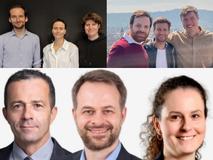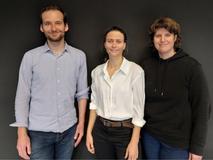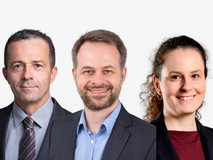CHF 40,000 for a software for the analysis of spectroscopic data, digital twins for connected mobility, and an immune-based cancer therapy
30.05.2023
RefFIT, Transcality, and Trojan Therapeutics win Venture Kick's second stage of financial and entrepreneurial support. Their projects aim to provide a complete no-code model-based analysis solution reducing the need for lengthy calibrations in material analysis; build a digital replica of traffic coupled with a ready-to-use simulation that enables to model future scenarios; and break up the immunosuppressive TME and generate an anti-tumor response with monocyte-based immunotherapy comparable to CAR-T cell therapies.
 |
 RefFit co-founders Dr. Willem Rischau, Dr. Iris Crassee, and Dr. Nicole Ruckstuhl
|
 Transcality: Sasan Amini, Lukas Ambühl, and Gabriel Tilg
|
 Trojan Therapeutics' team: Dr. med. Roberto Speck, Dr. Simon Bredl, and Dr. Sabrina Traxel
|
RefFIT: Software for the analysis of spectroscopic data
Spectroscopic data contains essential information on material type, properties, concentration, and quality but is notoriously difficult to analyze due to the complex nature of light and its interactions. Therefore, some companies develop ad-hoc inflexible custom codes, but most companies employ calibration curves, statistical methods, or data-driven machine learning. These expensive “black-box” analysis methods require lengthy data calibrations with limited predictive power. In addition, valuable information contained in the spectra is lost due to the simplified, inaccurate approach.
RefFIT is software for the analysis of spectroscopic data in material science, used by customers for product and process development, quality control, and sorting in industries like manufacturing, semiconductor and photonics, and recycling. RefFIT contains an extensive library of scientific models, linked and easily customizable thanks to techniques inspired by machine learning. They provide a complete no-code model-based analysis solution reducing the need for lengthy calibrations in material analysis. With RefFit, complex spectroscopic material analysis becomes easy, fast, more accurate, and accessible to all potential users. The co-founders are Dr. Iris Crassee, Dr. Nicole Ruckstuhl, and Dr. Willem Rischau, all are senior researchers at the science faculty of UNIGE. Their software significantly reduces the time to analyze data and build new models thereby enabling new applications, previously too complex and costly to develop, without requiring expert training.
The Venture Kick funding will be used to help fund the business development activities, marketing strategies and to build a prototype in collaboration with a critical client.
Transcality: Digital twins for connected mobility
Transportation networks are vital to economies, but urbanization and disruptive mobility concepts increase pressure on infrastructure. Real-time monitoring, testing, and implementation tools are paramount, but current practices rely on traditional data collection and laborious engineering processes. Current solutions lack transparency and traceability, with isolated partners and too many individual transportation models leading to slow, costly, non-inclusive, low-quality, and quickly outdated approaches.
Transcality utilizes big data, cloud computing, machine learning, simulation, and automatization to efficiently create digital transportation twins. This will result in affordable and quickly updated products/services which can be perfectly integrated into flexible transportation planning. The co-founders are Lukas Ambühl from ETH Zürich, Gabriel Tilg, and Sasan Amini. Their customers are public authorities (local, regional, and national level) and engineering companies. Expedient transportation planning is key to lower associated emissions. Ultimately, the startup can thereby contribute to creating a sustainable future.
With the CHF 40,000 from Venture Kick, the team will allocate funds towards further development of the API platform, such as hiring additional developers to improve the user interface and add new features. Additionally, some of the funds will be used towards marketing efforts to increase visibility for their city visualizations and broaden their customer base.
Trojan Therapeutics: Developing novel immunotherapy to fight cancer
While immunotherapies have revolutionized oncology, currently approved immunotherapies are not efficient against so-called “cold” tumors, i.e., non-inflamed solid tumors. The reason is the immunosuppressive nature of the tumor microenvironment (TME). Trojan Therapies aims to break up the immunosuppressive TME and generate an anti-tumor response with monocyte-based immunotherapy comparable to CAR-T cell therapies. The therapy targets monocytes that migrate into the tumor and usually differentiate into tumor-associated macrophages (TAMs), which promote tumor development, proliferation, and metastasis. Monocytes derived from the patient's blood are gene-engineered to replace the TAMs in the TME—like trojan horses—thereby reversing the immune-suppressive TME and activating the immune system against the tumor.
The startup has chosen triple-negative breast cancer as its first lead indication, which often affects women under 40 and has a far worse prognosis than other breast cancer types and accounts for 40% of all breast-cancer-related deaths. Only 60% of patients respond to first-line treatment and 40% suffer a relapse. The initial target population is a segment of patients in which the first line of treatment failed, which amounts to around 30,000 patients a year out of a total of 120,000 in Japan, the EU, and the US. The startup plans to scale the treatment for glioblastoma, ovarian cancer, and pancreatic cancer. The team consists of Simon Bredl, Sabrina Traxel, and Roberto Speck. Simon Bredl is one of the treatment's inventors and the project leader who is not only an experienced synthetic biologist, but has gathered startup experience with Redbiotec and Redvax; Roberto Speck, MD, the other inventor, is an expert for humanized mouse models and infectious diseases, and head of the HIV-1 research group at the University Hospital of Zurich; and Sabrina Traxel, postdoctoral researcher, is an experienced cancer immunologist specialized in acute lymphoblastic leukemia and pancreatic tumors.
With the funds awarded by Venture Kick, the startup will finance an FTO, development of the IP strategy, and networking activities.


